‘I couldn’t breathe’: Mollie O’Callaghan reveals anxiety attack before gold medal and discussed life after the Paris Olympics
Mollie O’Callaghan has sometimes struggled in the spotlight as an Australian swimming superstar. Now, she has revealed what really happened at the Paris Olympics – and the anxiety that overwhelmed her.
Stellar
Don't miss out on the headlines from Stellar. Followed categories will be added to My News.
Rather than head home on the chartered flight from Paris with other Australian Olympians shortly after the Games ended last month, Mollie O’Callaghan took time out for a family holiday.
And for a moment, as she walked over the bridges of Venice with her parents, she was like any other 20-year-old on a summer jaunt in Europe. The only thing that set her apart from the hordes of tourists was the precious cargo in her luggage: five Olympic medals.
“I hadn’t been on a family holiday in ages,” O’Callaghan tells Stellar.
“Like, I never get the time. And it’s really expensive. But it was really nice to just be a normal 20-year-old who could do anything and have that bit of freedom. I forget myself that I’m only 20. Everything has happened so fast.”
At the Tokyo Games in 2021, a 17-year-old O’Callaghan – then still little-known to most Australians – was a heat swimmer who won gold medals as a member of two relay teams.
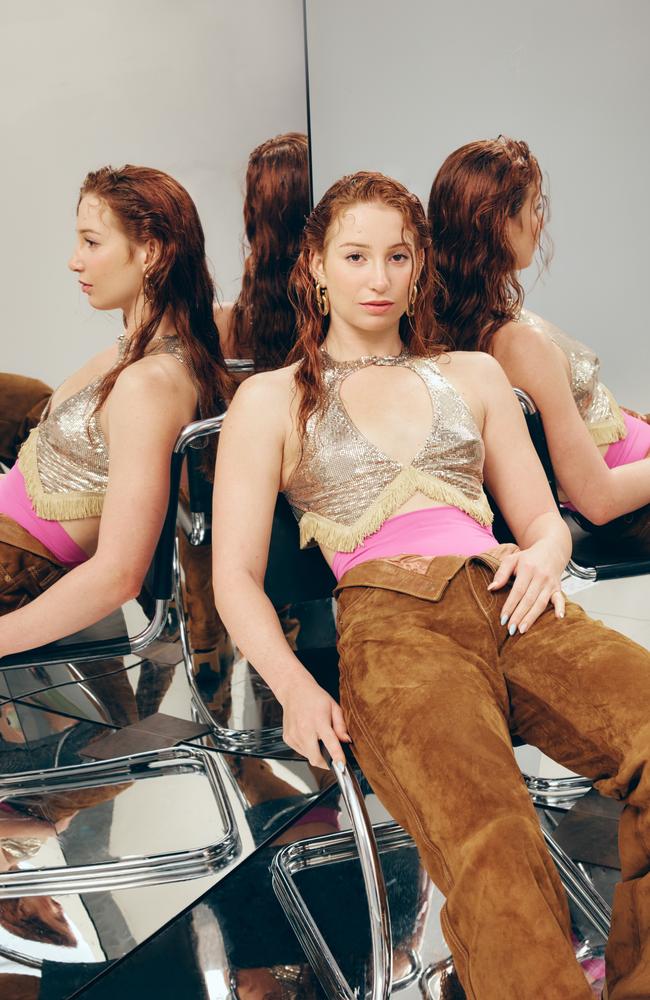
Three years later, after a week in Paris, she had become Australia’s most successful athlete of the 2024 Games, winning three gold (in the 4 x 100m and 4 x 200m freestyle relay as well as the 200m freestyle), a silver in the 4 x 100m medley relay and a bronze in the 4 x 100m mixed medley relay. And she did it in her own way, too. Unlike some other champions who ooze confidence and bravado, when the girl nicknamed “Mollie O” took to the blocks, she was visibly shaking, her hands struggling to adjust her goggles.
“I just want to make it an open space for everyone to express their feelings,” she says of her candid approach to the sport and media.
“It’s OK to be nervous. It’s OK to be angry, frustrated, sad … I feel those feelings. A lot of us are perceived as inhuman and feel we have to maintain that very strong, confident exterior, but so many people get nervous. It’s normal.
“And if you fight it and ignore it, it can hurt you in so many ways.”
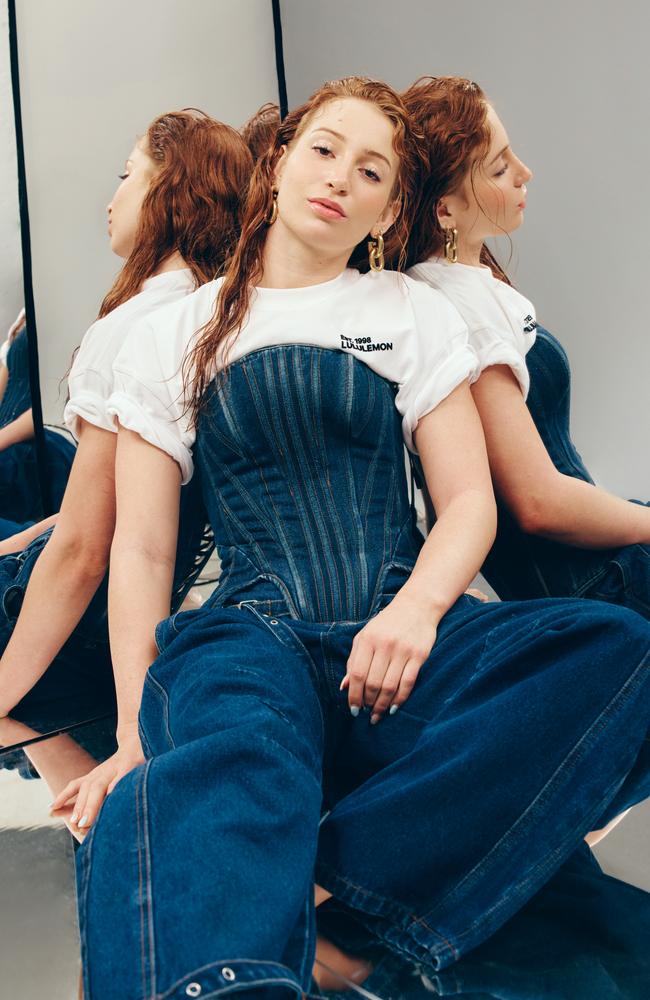
For O’Callaghan, who hails from Queensland, the downtime she spent in Europe with her parents, Nick and Toni, allowed her to take stock of what she had achieved, and also what it had taken to get there. Reflecting on seeing her youngest child (O’Callaghan has two older siblings, Sophie, 23, and Matt, 33) dominate in Paris, Toni says: “[The] standout moment for me was hugging Mollie after the 200m freestyle podium … It was everything we witnessed her go through in the last year that went into that one hug.”
Being surrounded by loved ones also gave the swimmer the space to process her perceived lows of her Games, such as not earning a medal in the 100m freestyle race despite being tipped as one of the favourites.
“A lot of [swimmers] do experience a very deep, dark state post-racing. It’s very common. I think it’s because we’ve built up to such a high spot; it’s the pinnacle for us,” O’Callaghan explains.
“It’s extremely hard to process. You second-guess some of your stuff. You’re really proud of what you’ve done, but you always have that little thought in your head like, what else could I have done? You strive for this one thing, and then it’s over and you’re like … ‘What’s next?’
“It’s part of the process. You kind of know there’s going to be a stage where [you’re] just going to be a little bit down. But you find ways to pick yourself back up.”
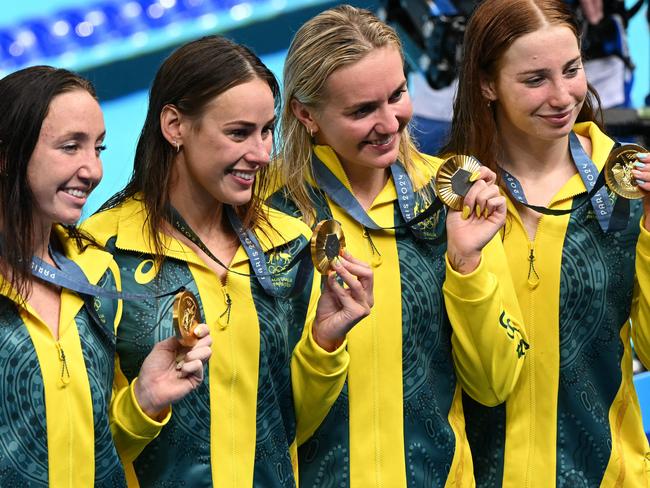
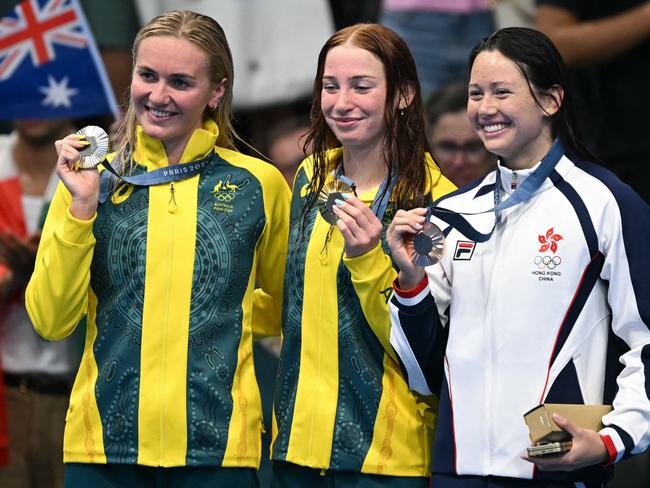
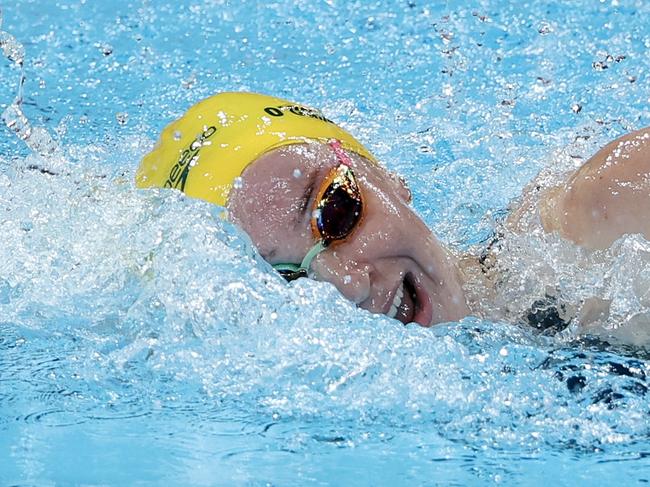
O’Callaghan has spent her life picking herself back up, never more so than after the Olympic trials that took place six weeks prior to Paris. In what was billed as the race of the meet, the swimmer – who then held the world record in the 200m freestyle – was up against her training partner and reigning 200m Olympic champion Ariarne Titmus.
“The night before the 200m freestyle at trials was the most nervous I have ever been,” O’Callaghan recalls.
“I had a bit of an anxiety attack. I couldn’t breathe. I felt like there was so much pressure and expectation to perform, especially being a world-record holder.
“In the back of my mind, I know no matter what, everyone will be proud of me. But there are moments where it becomes a little too much.”
O’Callaghan went on to break her own world record in the trial, yet she still finished second behind Titmus. After the race, she was visibly upset. An experience like that could have destroyed her, but as she says, “I didn’t want to give up.”
Leaning on her coach Dean Boxall, as well as a psychologist and her family and friends, O’Callaghan regrouped.
“There have been so many times [when] I was like, ‘I don’t think I can do this.’ Even within training, there have been moments where I’ve had to deal with injuries. But the most important thing is having a great community and great relationships behind you, because when you’re in that moment, they’re there for you. And you can return to that.”
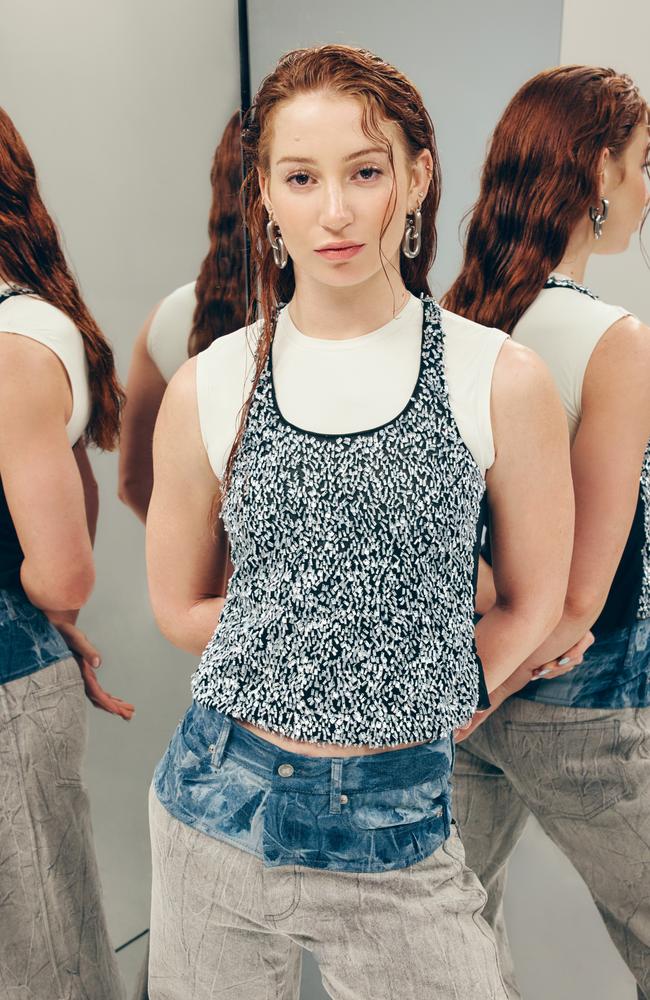
Heading into Paris, O’Callaghan was understandably on edge, particularly as hype built around what many were dubbing the race of the Games, an epic face-off between her and Titmus in the 200m freestyle final. Yes, she was still nervous – but not quite at the level of those trials. “It’s like I’d learnt how to deal with them,” she tells Stellar.
“As my coach said, ‘It’s better that it happened at trials than in Paris.’ Going into that final, I had to switch my mentality.
“I had to think, I’ve got nothing to lose. I’m not the world-record holder anymore. I was never the Olympic champion. There’s nothing that I’ve got to lose in this. I’ve just got to be myself. I overthink things, and it’s hard to try and switch off. But I really love swimming; I do it because I really love it. And I’ve just got to think about the positive things and use the tactics that my psychologist helps with. All those little things kind of help me get to that point.”
This time, it was O’Callaghan who emerged victorious. As she touched the wall ahead of Titmus (who won silver), O’Callaghan recalls, her immediate feeling was one of relief.
“I’ve probably been training for the 200m more than the 100m. It’s probably been the one thing that I had set in my mind the most. I’m still learning how to race it but just touching the wall, I thought, I’ve done it where it counts. I’m glad I stuck to my processes and trusted everything.”
In a display of graciousness, she shared her first individual gold-medal moment with Titmus, inviting her onto the top dais for the national anthem after the medal presentation.
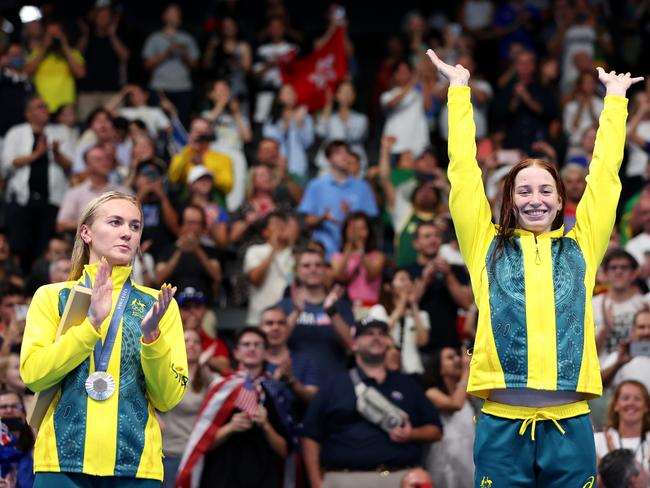
O’Callaghan acknowledges that while the most common question she’s asked is about her relationship and training with Titmus (“It does get a bit tiring,” she says. “We know we train together. It’s something we both signed up for and both acknowledge and we’re fine with it”), she says she never questioned sharing that moment.
“It wasn’t a thought in my mind. I was just thinking, this is for Australia; this isn’t for us. No matter who stood on that podium out of us two, it was Australia that won. No matter what, it’s an incredible achievement. It should be shared. We both respect each other. She has achieved so much. We’ve gotten to this point because of each other. We push each other to this point. In swimming, like in any sport, there has to be competition for you to thrive.”
And O’Callaghan did just that in the relay events, too, making history as part of the 4 x 100m freestyle relay team that brought home Australia’s fourth straight Olympic gold, and winning another in the 4 x 200m freestyle relay.
The joy on her face after winning silver in the women’s 4 x 100m medley relay was evident as she and her teammates Emma McKeon, Kaylee McKeown and Jenna Strauch jumped into the pool at La Défense Arena fully clothed.
Paris would make her a household name in Australia, but also around the world. O’Callaghan, who lives at home with her parents, tells Stellar she’s now hearing from fans – and receiving some declarations of love – from across the globe.
“I get so many messages, a lot from younger athletes who tell me about their story, and I love seeing that. Then I get some of the weirder things … like marriage proposals. I get asked, ‘Will you be my girlfriend?’ It does make my day, because I think it’s so funny.”
There has also been an increase in the media demands and sponsorship opportunities coming her way. Just before Paris, she signed a deal with international activewear brand Lululemon to become its newest ambassador, a partnership she says she’s “been dreaming of”.
She recalls, “Going into training and seeing those girls with Lululemon, I’d try and get the same thing to match. I wanted to be like those girls.”
Beyond the exposure they can provide, O’Callaghan says brand partnerships can be life-changing for athletes – and their wallets. “We don’t really earn what people think we do,” she explains.
“We actually don’t get enough to live. It varies for each person, and actually varies for each gender, too. I’m fortunate enough to be in a sport where we do get paid the same – but a lot of younger athletes don’t get to continue [in] sport because they’re not able to afford it.
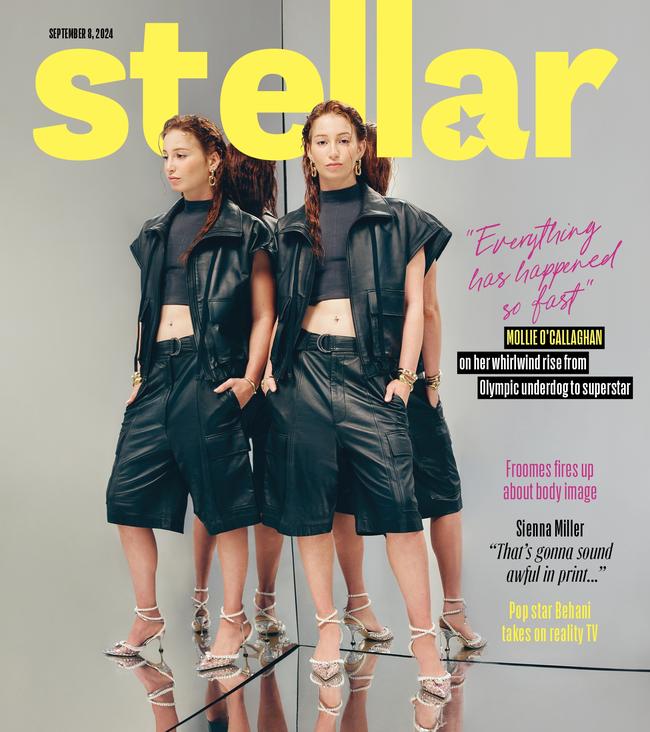
“I’m very thankful for sponsors because I wouldn’t be in this sport [otherwise]. When I first moved to [train at] St Peters [Western Swim Club in 2019, at the age of 15], my family couldn’t afford swimming. And I’m very thankful that I stuck to it and I was able to get sponsors to help.”
While O’Callaghan is happy to now devote time to her sponsorships, she plans to take several months away from swimming. “I don’t really want to go near a pool,” she admits with a laugh. “It’s a hard one because swimming is very therapeutic. But I just want to reset and have a good relationship with the pool. Sometimes you need a really good break to continue that.”
She’s also looking ahead to another family gathering, this time at home. While she was in Paris, just after she finished racing, O’Callaghan’s grandfather suffered a stroke following an operation.
She says that while his recovery has been hard, she’s grateful he was able to watch her race in Paris. “That was something he was really looking forward to and I’m glad I got back to show him all my medals,” she says.
“When he gets out of hospital, my brother is going to organise a big family barbecue and have a big feast.”
Encouragingly, Australia’s newest swimming superstar also has her eyes on what lies ahead. “I’ve had time to reflect and I’m really, really proud of myself and the team and what we’ve accomplished. It has fuelled me to achieve a lot more in the future,” she tells Stellar.
“There were some things I was a little bit disappointed in, but, you know, it really adds to my determination. I want to do more.
“I want to achieve more. I can’t wait to continue swimming and see what else I can do. This is the most determined I’ve ever felt.”
See the full shoot with Mollie O’Callaghan in the latest issue of Stellar. For more from Stellar and the podcast, Something To Talk About, click here.



